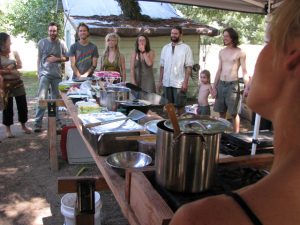Week Four: Intentional Communities
July 10-14:

- Overview of Intentional Communities, Co-Housing, Ecovillages.
- Legal Structures for owning and sharing land and resources
- Zoning, Codes, Permits, Class K Owner-Builder permits
- Social permaculture- specific applications and collaborative design process for a bio-cultural corridor
- Tiny Homes and Tiny Power. Shared community resources.
- Land: Real estate, wastewater, well water, energy. How these can be shared and bring the cost of development down.
- This 5-day module is only $350 for the week.
The final week concludes with an overview of the Intentional and Egalitarian Community movement. We will look at the various examples of successful sustainable communities, and address many of the legal restrictions, pitfalls, and challenges that come with buying land with others wishing to build a practical, sustainable vision of the future.
Presenters this week:
- Katie McCamant (Monday/Tuesday)
- Ma’ikwe
- Cliff Paulin/Lindsay
- Juliana
- John EriK
- Alexa
- Dan
The Laytonville Ecovillage is a living laboratory offering insights in how to deal with county and state regulators, zoning, codes and permits, difficult neighbors, and how you can fit a round peg into a square hole! Come share your stories, successes and chalenges.
I do not think the measure of a civilization is how tall its buildings of concreate are, but rather how well its people have learned to relate to their environment and fellow man.
~ Chippewa ~
 Workshops and presentations on Intentional communities, Ecovillages, Co-Housing, Legal and Bio-cultural Structures (social permaculture)
Workshops and presentations on Intentional communities, Ecovillages, Co-Housing, Legal and Bio-cultural Structures (social permaculture)
Videos and Alternative Communities Resources
Intentional Communities Organizations
From the Fellowship of Intentional Communities website
“The FEC is a union of Egalitarian Communities which have joined together in our common struggle to create a lifestyle based on Equality, Cooperation, and Harmony with the Earth.“
Community Commerce Alternatives – Blockchain and Timebanks
The Block chain is an innovative, distributed record keeping and “medium of exchange” system with which the basis of cultural exchange can happen. Bitcoin is the most famous application of this technology, and others will be arriving soon. Imagine a system in which information about transactions is distributed across a network of computers on a “block chain” instead of organized and controlled by Central Bankers. (Bitcoin wallets)
Timebanks and Life Dollars
Timebanks and The “Life Currency Cooperative Exchange”
In Timebanks, Life Dollars and various versions of the “member skills/needs exchanges” concepts have as a basic unit, an hour of time is valued at a fair living wage in your area. This is subject to individual contracts, so people who provide tools and specialty skills can value the exchange differently than 1-hour for 1-hour exchange. It’s all about the individual contracts – not the dictates of a wall street, government defined value and taxation system.